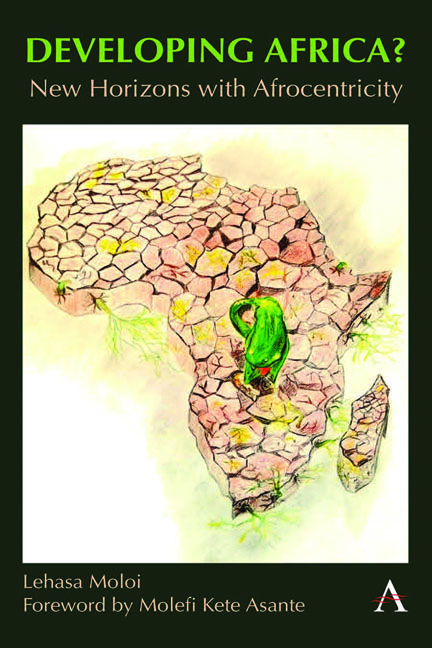Book contents
- Frontmatter
- Contents
- Foreword
- Preface
- Acknowledgements
- Relevance of the Dialogue
- Overview of the Book
- 1 Introduction
- 2 Theoretical Grounding: Afrocentricity’s Approach to Development
- 3 Critique of Eurocentrism and a Mapping of African Development Initiatives
- 4 Afrocentricity on the Significance of African History for Development
- 5 Afrocentricity on the Significance of Culture in the Conceptualization of an African Development Paradigm
- 6 Afrocentricity on the Significance of African Agency in Development in Africa
- Bibliography
- Index
2 - Theoretical Grounding: Afrocentricity’s Approach to Development
Published online by Cambridge University Press: 13 April 2024
- Frontmatter
- Contents
- Foreword
- Preface
- Acknowledgements
- Relevance of the Dialogue
- Overview of the Book
- 1 Introduction
- 2 Theoretical Grounding: Afrocentricity’s Approach to Development
- 3 Critique of Eurocentrism and a Mapping of African Development Initiatives
- 4 Afrocentricity on the Significance of African History for Development
- 5 Afrocentricity on the Significance of Culture in the Conceptualization of an African Development Paradigm
- 6 Afrocentricity on the Significance of African Agency in Development in Africa
- Bibliography
- Index
Summary
Afrocentricity has become the dominant intellectual paradigm in the analysis of African phenomena in the last two decades, if not longer. Afrocentricity was conceptualized and developed through the skilful writings of Molefi Kete Asante, who is the leading theorist, and Chair of the Africology and African American Studies Department at Temple University (Philadelphia, Pennsylvania), which is considered the construct's intellectual home. The primary role of Afrocentricity has been to depose the dominant Eurocentric paradigm, which has been identified as a leading cause of the de-centring and dislocation of Africans from their own historical and cultural experiences.
Thus, Afrocentricity proposes the relocation and the re-centring of African persons within their own historical, political and cultural context as a key for their liberation from Eurocentric epistemic domination. More than anything else, Afrocentricity is a paradigm of agency and action; it seeks to decentre Europe, its knowledge system and its hegemonic practices from the centre of African reality and replace it with an African-based knowledge system, informed by African history and culture, as framed within the lived experiences of African people transcontinentally and trans-generationally. This implies that establishing the intellectual location of the researcher is indispensable to any examination of African people's culture, politics, spirituality, economics and psychology in general. It is critical to understand in this study that Afrocentricity is not articulated as a fixed corpus of ideas or perspectives, or as a closed system of beliefs.
Since the advent of the colonization of Africa by Europe, starting in the early fifteenth century, information regarding the continent of Africa and its people has been articulated from a European point of view, with the effect of submerging an African world view. The call for the liberation of Africans from the European political hegemony and subsequent neocolonial ties in the post-independence era has coincided with calls for a liberation of epistemology. The challenge that the newly independent nation-states faced was how to develop themselves by improving the quality of life for African people. Regarding education, the main challenge was to liberate African minds from the ravages of the legacy of the colonial knowledge system.
- Type
- Chapter
- Information
- Developing Africa?New Horizons with Afrocentricity, pp. 15 - 42Publisher: Anthem PressPrint publication year: 2024



